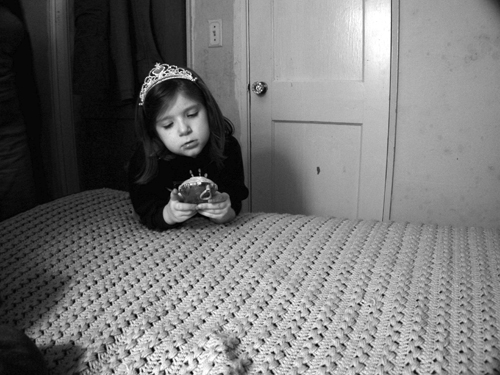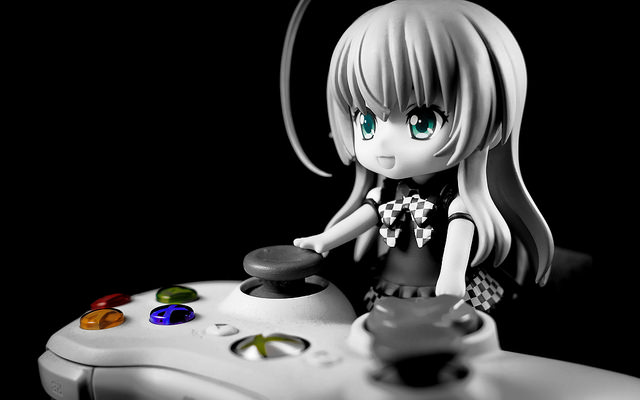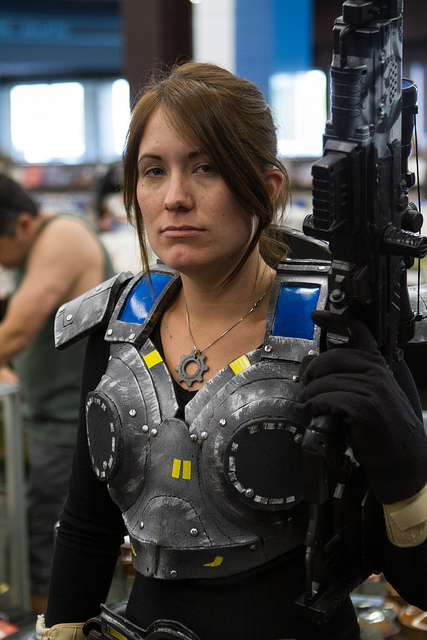GamerGate, The Internet’s First Civil War: “It’s About Ethics in Misogyny”

Featured Image: “Pixel Princess” by Carin Rhoden via CC BY-NC-ND 2.0.
I knew I wanted to talk about GamerGate, but I had a hard time picking out a specific subtopic because there was so much to discuss. Where did I want to start?
Did I want to talk about GamerGate’s ‘humble’ origins of an ex-boyfriend sex-shaming Zoe Quinn and sparking an online campaign of misogyny? Did I want to talk about the harassment and death threats to public figures like Anita Sarkeesian, who critiques video games for their representations of women? Did I want to talk about how if someone, especially if they were a female someone, were doxxed if they spoke out against GamerGate, like Felicia Day, Brianna Wu, and so many others? Did I want to talk about the gamers who say they support women in gaming and don’t stand by misogyny, yet still support GamerGate whose main numbers and message does support hatred against women?
You can see why I’m left scratching my head because I really could go on and on. I think if you’re reading this, these things are unfortunately familiar and many women, not just the ones in the spotlight, are threatened by a conservative core of individuals (gamers or not) who do not like girls sharing their fun, or pointing out any of its flaws.

GamerGate first started with a bitter ex-boyfriend, Eron Gjoni, detailing the crash and burn of his relationship with game designer Zoe Quinn on public gaming forums (and even a standing wordpress blog aptly named The Zoe Post.) He described her involvement in alleged affairs with journalists, game designers and producers, and other influential figures in the gaming industry as what ultimately ended their relationship, which came off as acutely emotional and very sad.
Except, it didn’t just end as a lover’s quarrel or accusations of infidelity: it started a war.
The gaming industry is notably intimate, and it doesn’t take much to rock the boat in their world. So when this came out there was a large backlash, not just against Zoe Quinn but anyone that may have had anything to do with her in the gaming sphere. Journalists’ reviews and articles in her support were now seen as inappropriately influenced and some were removed from their positions.
Newsweek’s Taylor Wofford weighed in on this, saying, “In theory, GamerGate is about preventing relationships between video game developers and video game journalists from becoming too cozy. In practice, however, it is a tidal wave of online misogyny directed against women […] who dare speak up against sexism in video games.”
The point is, what has transpired between Eron and his ex, and what was Zoe’s private life, has now morphed into a large hate-ball avalanche that many fringe groups with discrimination as their M.O. have latched onto. It’s no longer fixable via an apology or by clearing it up with an interview; so many people have been hit sideways with a polarizing “are you with us or against us” attitude that I feel like (and correct me if I’m wrong) GamerGate is the Internet’s first civil war, and their main targets are women.

One of these women is Anita Sarkeesian who leads a popular video series on Youtube, “Tropes Vs. Women”, and runs Feminist Frequency, a blog that has smart and clever feminist commentary on popular media. Interestingly enough, the harassment for her didn’t start when GamerGate did – it started back as early as 2012, after she launched a modest KickStarter to crowdfund an in-depth version of her free YouTube series. While she received her crowdfunding goal (and more), the support was also followed by a backlash of anonymous users who felt threatened by her critical look of how women are presented in games. Along with her YouTube channel’s stream, harassment in the form of comments flowed onto her blog and her Twitter, e-mails, photoshopped pictures depicting violent rape and death of Sarkeesian at the hands of male video game characters, and last but not least: a man named Ben Spurr created an online game where a user can punch Sarkeesian’s face over and over again. It is called “Beat Up Anita Sarkeesian.”
Again, this was all before GamerGate became a huge thing (two years difference), which makes one wonder if Zoe Quinn was just the match that lit the fire, and if that fire was really that hard to start in the first place? Are women really welcome in gaming? Are they a silent majority that keeps mum, going about their lives until it’s disrupted by misogyny we know is lurking in the background?

Another woman who has been caught in the crossfires of GamerGate is Felicia Day who is best known for her starring and creative role on The Guild, which has male and female characters of different ages, ethnicities, and backgrounds participating together to show what contemporary online gamers are like. As a central figure to many in the gaming industry, an avid gamer herself, and a respected actress, Felicia Day was not a polarizing figure in GamerGate. That is, not until she broke her silence in light of the increasing fury and shouting matches on both sides to give her humble support to these women and share her perspective on it.
In her own words on her blog, she states, “I have not said many public things about Gamer Gate. I have tried to leave it alone, aside from a few @ replies on Twitter that journalists have decided to use in their articles, siding me against the hashtag. Why have I remained mostly silent? Self-protection and fear.” She goes on to say, “I have been through a lot in my years on the internet. I have encountered a small fraction of the attacks from people like the ones who currently represent the worst of this “movement”. […]The attacks I experienced over the years were NOTHING compared to people who are the victims of these attacks now, but I still thought early on during the Gamer Gate phenomenon, ‘These trolls will dissipate into the night like they always do, it will be fine.’”

Then she drops the bombshell that her biggest fear that has kept her commenting is the fear of her privacy being violated: “I have been terrified of inviting a deluge of abusive and condescending tweets into my timeline. I did one simple @ reply to one of the main victims several weeks back, and got a flood of things I simply couldn’t stand to read directed at me. I had to log offline for a few days until it went away.”
A few lines later, she admits to her own problems with individuals violating her privacy in the past, “I have had stalkers and restraining orders […] I have had people show up on my doorstep when my personal information was HARD to get. To have my location revealed to the world would give a entry point for a few mentally ill people who have fixated on me, and allow them to show up and make good on the kind of threats I’ve received that make me paranoid to walk around a convention alone. I haven’t been able to stomach the risk of being afraid to get out of my car in my own driveway because I’ve expressed an opinion that someone on the internet didn’t agree with.”
Only hours after she released this brave statement to stand against the harassment and risk her own safety, Felicia Day’s private details (her address and phone number) were posted below her own blog post by an anonymous user.
When will enough be enough? There is an overwhelming sense of helplessness that women already feel by existing in a legal gray area when it concerns to the violations of their privacy, and these incidents are the strongest in a culture where information flows like water in a waterfall. Against violent, unstable individuals, action is often too late in many of these cases and there is often no recourse against those who “dox” individuals online.

To GamerGaters who insist that there is no misogyny intended in their movement, and that feminists are the one who have blown this argument out of proportion, tell that to Anita Sarkeesian, to Felicia Day, to Brianna Wu, and to the countless unnamed anonymous women who have signed off and deleted their accounts because they were targeted once their gender was discovered and they were subjected to unwanted advances and threats.
I believe these are important questions that we, as feminists, should pose because there should not be an arena we are not allowed to enter, to speak into, nor should there be a moment where we hesitate to speak out like Felicia Day hesitated before speaking out, because we are afraid of the consequences of someone harming us.
There are many important lessons to be learned from GamerGate: misogyny is still alive and thriving, and those that refuse that and fail to address it and prevent it, are only enabling it to exist.





Hey, its not about hating women. There have been serious ethical violations. We have been harrassed for trying to point them out because some of the people who have been terrible associate with prominent feminists. The people against gamergate made this about feminism.Its not, its actually about ethics in videogame journalism. If you want to read why I would suggest reading the gamergate dossier that was just written for the press.
Agreed. Nice to see someone on this site supports this movement.